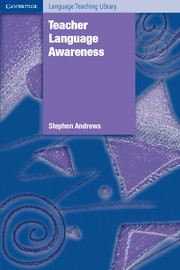Book contents
- Frontmatter
- Contents
- Acknowledgements
- Introduction
- Prologue: The challenge of being ‘language-aware’
- 1 Language Awareness, ‘Knowledge About Language’ and TLA
- 2 TLA and the teaching of language
- 3 TLA and the ‘grammar debate’
- 4 TLA and teachers' subject-matter cognitions
- 5 TLA and pedagogical practice
- 6 The TLA of expert and novice teachers
- 7 TLA and the native-speaker and non-native-speaker debate
- 8 TLA and student learning
- 9 TLA and teacher learning
- Epilogue: TLA and teacher professionalism
- Appendix
- References
- Index
- Publisher's acknowledgements
7 - TLA and the native-speaker and non-native-speaker debate
Published online by Cambridge University Press: 30 July 2009
- Frontmatter
- Contents
- Acknowledgements
- Introduction
- Prologue: The challenge of being ‘language-aware’
- 1 Language Awareness, ‘Knowledge About Language’ and TLA
- 2 TLA and the teaching of language
- 3 TLA and the ‘grammar debate’
- 4 TLA and teachers' subject-matter cognitions
- 5 TLA and pedagogical practice
- 6 The TLA of expert and novice teachers
- 7 TLA and the native-speaker and non-native-speaker debate
- 8 TLA and student learning
- 9 TLA and teacher learning
- Epilogue: TLA and teacher professionalism
- Appendix
- References
- Index
- Publisher's acknowledgements
Summary
Introduction
The issue of native-speaker (NS) and non-native-speaker (NNS) teachers of language, especially of L2 English, has been extensively discussed in recent years. It is an issue that inspires passionate debate, both within and outside the profession. The present chapter attempts a dispassionate analysis of the issue, with particular reference to the TLA of teachers of L2 English. The chapter begins by outlining some of the background to the debate. It then goes on to examine the arguments and research findings concerning the relative merits of NS and NNS teachers in relation to the three types of language-related knowledge encompassed by the label TLA: knowledge of language (i.e. language proficiency), knowledge about language (i.e. declarative knowledge of subject matter) and knowledge of students (especially the cognitive knowledge of learners as it relates to subject matter). It concludes with a brief discussion of English as a Lingua Franca (ELF) and the potential impact of ELF on any consideration of the relative merits of NS and NNS teachers.
The background to the issue: letters to the editor
At the time that I was writing this book, the two letters below appeared in the South China Morning Post. As the opening sentence of the first letter indicates, they formed part of a correspondence relating to professional standards among Hong Kong's teachers of L2 English, and to the role of NS teachers of English, including those, known as NETs (Native English Teachers) in the Hong Kong context, who have been recruited as part of the Hong Kong Government's drive to improve standards of English Language teaching in Hong Kong schools.
- Type
- Chapter
- Information
- Teacher Language Awareness , pp. 143 - 166Publisher: Cambridge University PressPrint publication year: 2007



